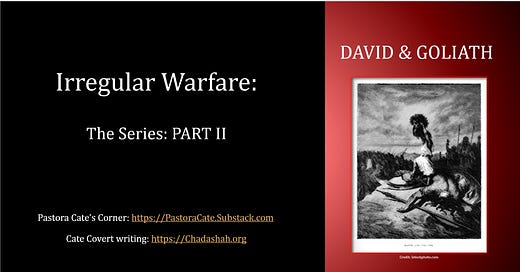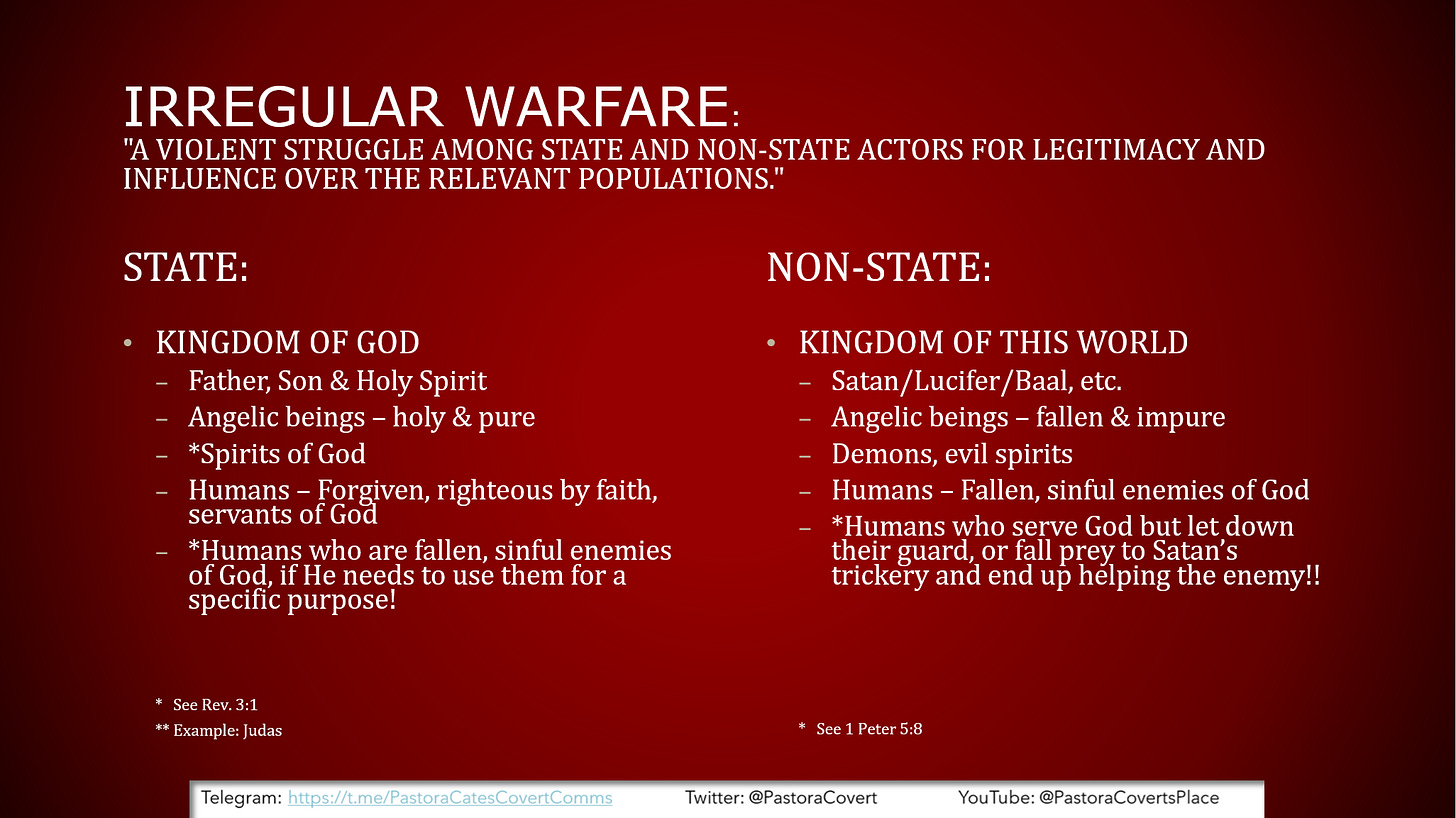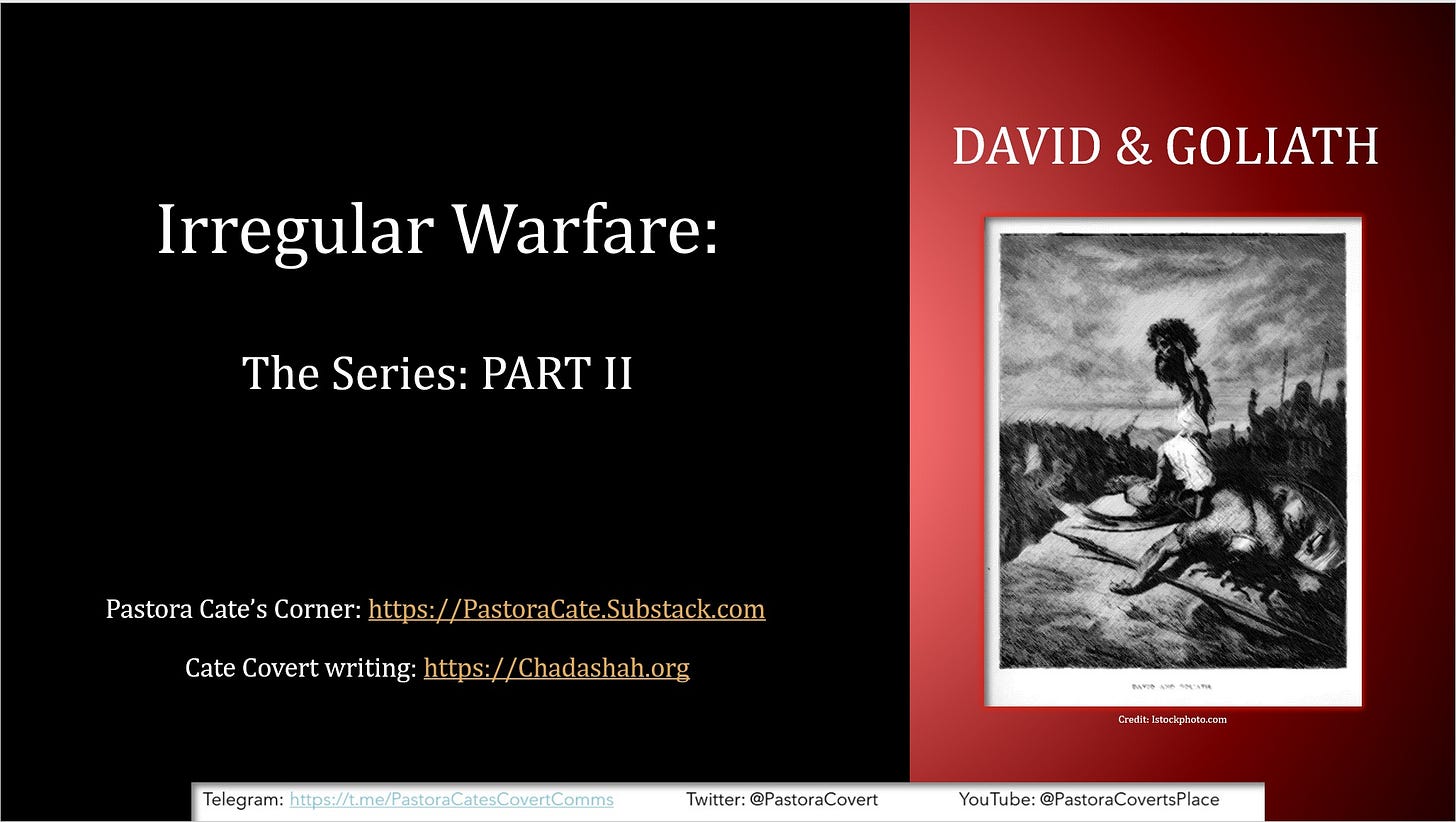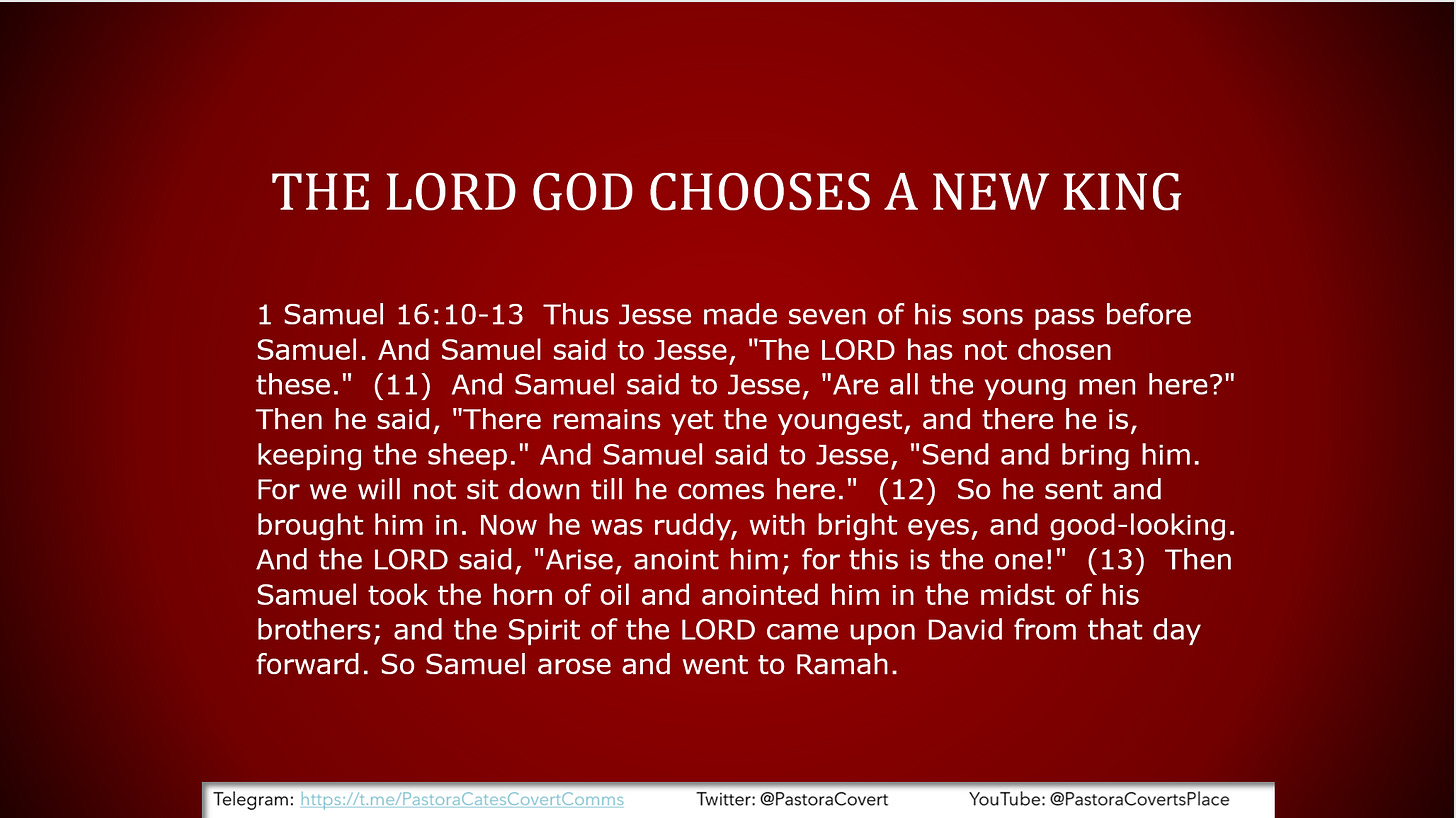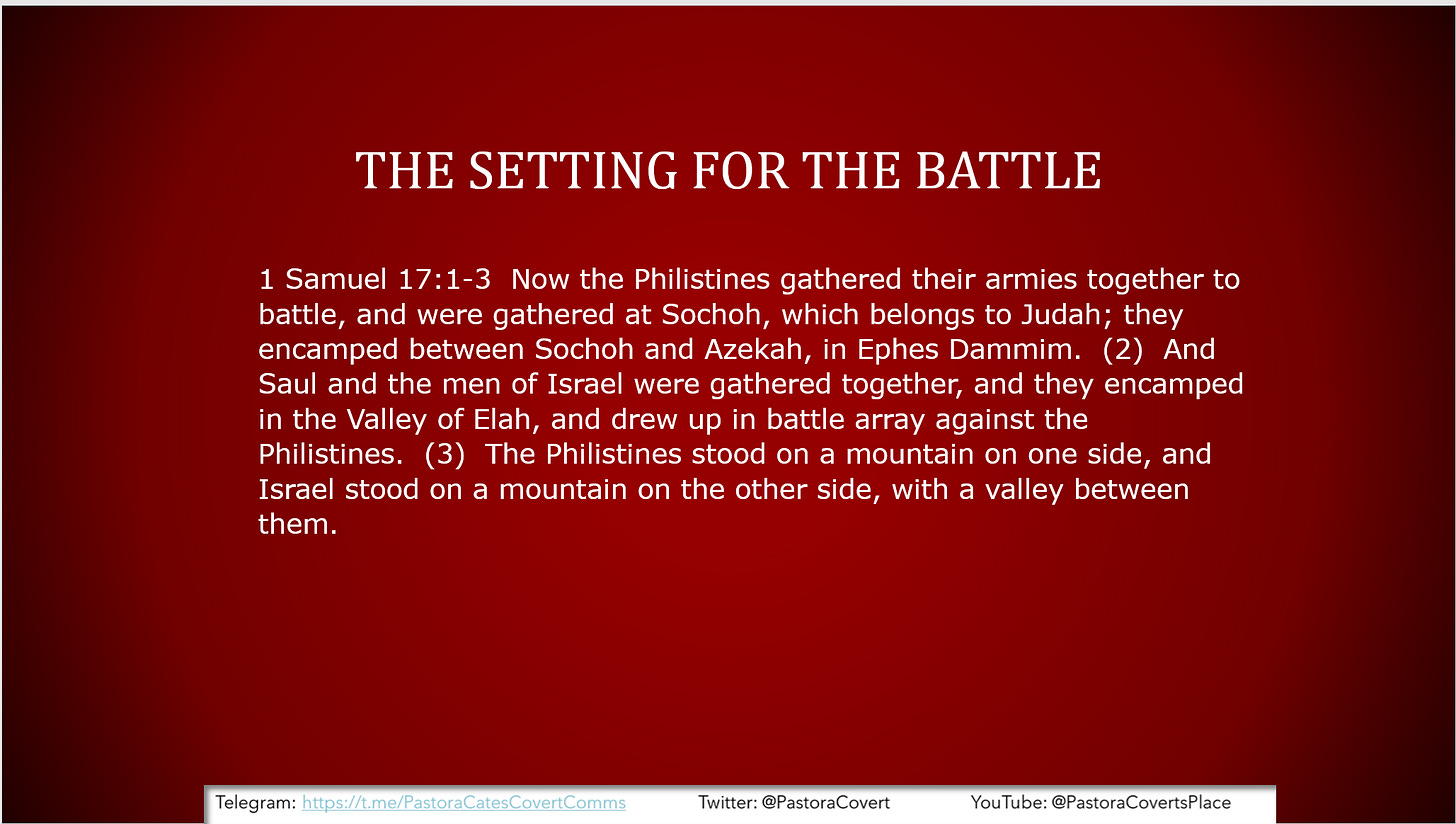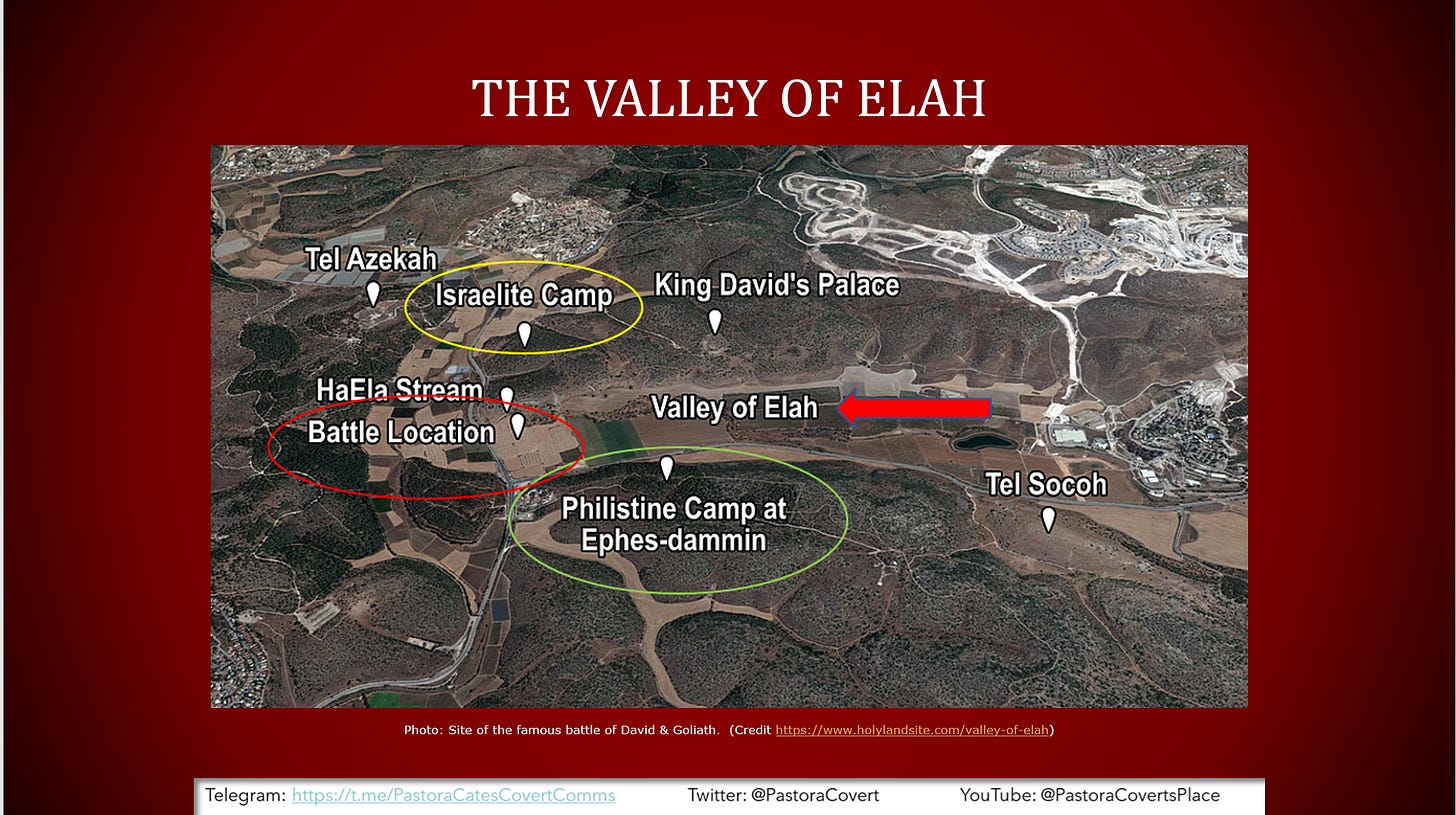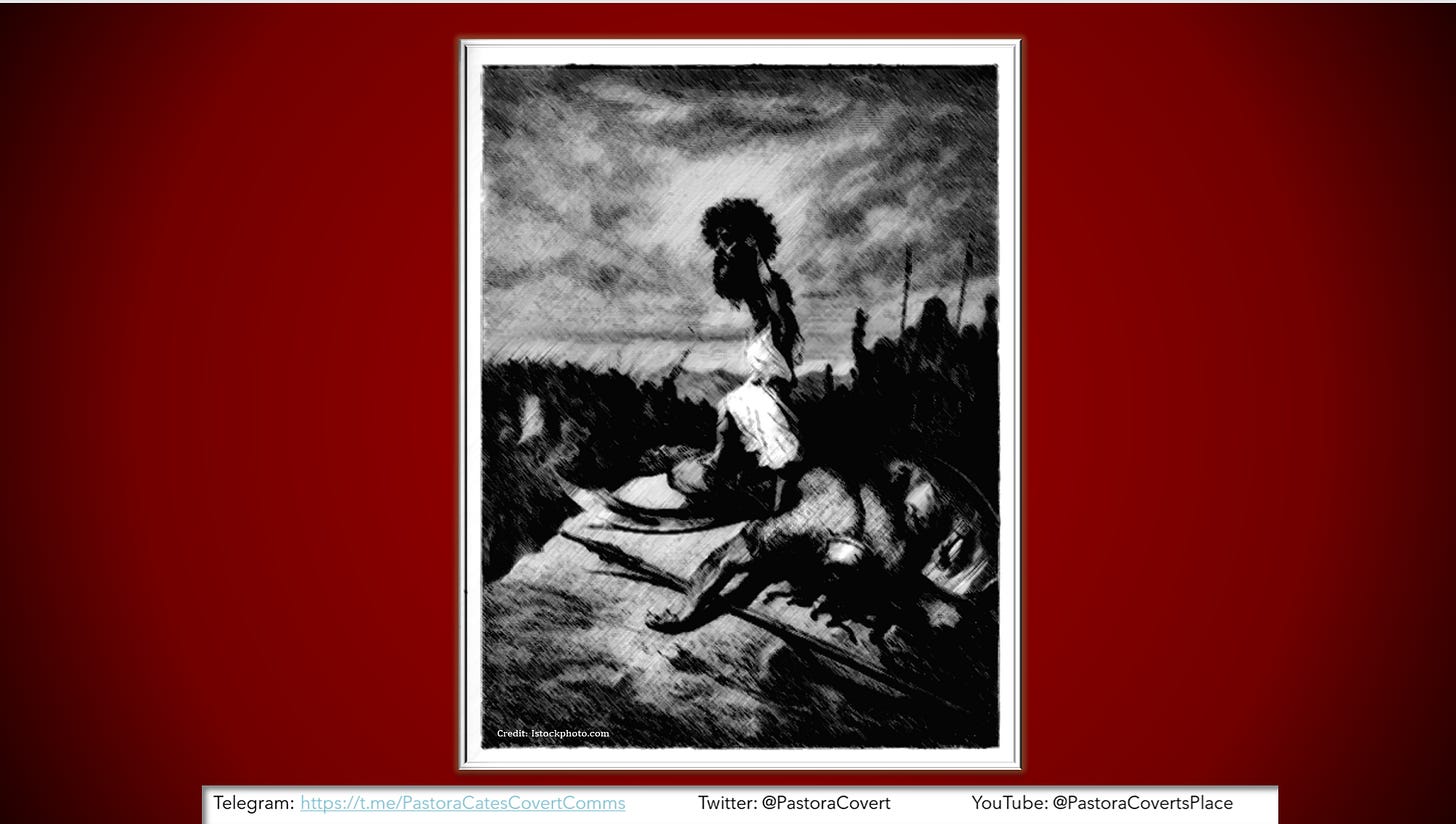Good morning. Today, let’s start with a review of our definition of Irregular Warfare.
According to Wikipedia, irregular warfare is: “a violent struggle among state and non-state actors for legitimacy and influence over the relevant populations.”
For this series, we have defined our State vs. Nonstate actors as:
State
Nonstate
• KINGDOM OF GOD
– Father, Son & Holy Spirit
– Angelic beings – holy & pure
– *Spirits of God
– Humans – Forgiven, righteous by faith, servants of God
*Humans who are fallen, sinful enemies of God if He needs to use them for a specific purpose!
• KINGDOM OF THIS WORLD
– Satan/Lucifer/Baal, etc.
– Angelic beings – fallen & impure
– Demons, evil spirits
– Humans – Fallen, sinful enemies of God
– *Humans who serve God but let down their guard or fall prey to Satan’s trickery and end up helping the enemy!!
* See 1 Peter 5:8
See if you can pick out the State and Nonstate actors in today’s story.
Our story opens in the book of 1 Samuel, as the Lord God deposes one king of Israel and anoints another.
God rejects King Saul.
The people of Israel had rejected God as their king. They wanted a human king like the pagan nations around them. God told Samuel to listen to them and to warn them of the consequences of having a human king. (You will find this story in 1 Samuel, chapters 8-9)
God arranged a divine meeting between the prophet Samuel and the future king Saul of the tribe of Benjamin. (You can read about this in 1 Samuel, chapter 10)
Saul was handsome and humble at first. He began in zeal and started as a good king. However, though God sent His Spirit to Saul, within two years, Saul had failed to obey Him or listen to His prophet, Samuel.
Saul appeared to take it for granted that God would always favor him and Israel. But Saul was no longer concerned about the presence of God in his life and began to scorn the importance of obedience.
Saul was impatient and did not respect Samuel’s authority and office; it was Samuel’s responsibility to make an offering to the Lord, but Saul did not wait for Samuel and usurped his place as prophet and priest by building his own altar to make a sacrifice before a battle with the Philistines. Because of this, in Saul’s second year as king, God told him through Samuel the prophet:
“But now your kingdom shall not continue. The LORD has sought for Himself a man after His own heart, and the LORD has commanded him to be commander over His people, because you have not kept what the LORD commanded you.” (1 Samuel 13:14)
God gave deliverance from the Philistines in that first battle through Saul’s son, Jonathan. But by the time of the second battle, the fear of the Philistines was upon all of Israel. (See 1 Samuel 14)
The Lord God had removed His Spirit from King Saul because of Saul’s rebellion toward the Lord. He had made an unlawful sacrifice because he was impatient to get to war with the Philistines and didn’t want to wait for Samuel to come. He also took plunder from war with Amalek instead of obeying God by destroying all the people and all they owned. God regretted setting Saul up as king and sent Samuel to anoint a new king. The Philistines would eventually kill King Saul at Gilboa.
This brings us to the story of David and Goliath.
The Lord God chooses a new king
We first learn of David, the future king of Israel, in 1 Samuel 16. Before David famously killed Goliath, the Lord had sent Samuel to anoint him as king of Israel.
1 Samuel 16:10-13 Thus, Jesse made seven of his sons pass before Samuel. And Samuel said to Jesse, “The LORD has not chosen these.” (11) And Samuel said to Jesse, “Are all the young men here?” Then he said, “There remains yet the youngest, and there he is, keeping the sheep.” And Samuel said to Jesse, “Send and bring him. For we will not sit down till he comes here.” (12) So he sent and brought him in. Now he was ruddy, with bright eyes, and good-looking. And the LORD said, “Arise, anoint him; for this is the one!” (13) Then Samuel took the horn of oil and anointed him in the midst of his brothers; and the Spirit of the LORD came upon David from that day forward. So Samuel arose and went to Ramah.
The Spirit of the Lord came upon David from that day forward.
We must see that David understood authority to understand how a teenage shepherd boy could fight Goliath. He was the youngest of eight brothers, so there was no shortage of people to boss him around.
The authorities over David were many:
1. YHWH God was David’s HIGHEST AUTHORITY and HIGHEST PRIORITY
2. Samuel the prophet (when he anointed David king)
3. King Saul
4. His father
5. His brothers
David had the job of tending his father’s sheep. He spent his days and nights with the sheep: protecting, watching over, defending, and comforting them. No doubt, he sang to his God and his sheep as he composed some of the magnificent Psalms we so love today.
David had the seeds of prophecy in him, as we can see in the Psalms about the Messiah who was to come. The Spirit of the Lord clearly spoke to and through David, even as a teenage boy with the heart to fight the giant Goliath of Gath and defend the name of his God.
David made the most of his isolation in the sheep meadows. He learned how to meditate on the Word of God and wait on the Lord. These habits would stand him in good stead in the future when the king that God rejected (Saul) chased him in the wilderness, intent on killing him.
David learned devotion:
Devotion to God - #One priority, and the key to David’s success, was to draw near to God, and God would draw near to him. He knew that God is a PERSON and that He FEELS.
Devotion to his duty – David learned this as a son, brother, and servant to the king.
Devotion to the flock of sheep – David put his own life on the line to protect them. He killed lions and bears, snatching the precious lambs out of their mouths. Their welfare was his chief concern. This future king would treat his subjects fairly and mercifully because of the years he spent tending his father’s sheep.
Though his brothers accused him of pride and insolence, David had a right heart before God. All would soon see that the Lord God was about to perform something extraordinary in the life of the future king of Israel.
David’s heart was right. He was wholly devoted to God in his humility, and the Lord God blessed him.
The future King David would eventually put down the Philistine rebellion and force them into submission.
What is the origin of the war between Israel and the Philistines?
It goes back to God’s covenant with Abram:
Genesis 15:18-21 On that day the LORD made a covenant with Abram and said, “To your descendants, I give this land, from the Wadi of Egypt to the great river, the Euphrates— (19) the land of the Kenites, Kenizzites, Kadmonites, (20) Hittites, Perizzites, Rephaites, (21) Amorites, Canaanites, Girgashites and Jebusites.”
God spoke through the prophet Jeremiah concerning the defeat of the Philistines:
Jeremiah 47:1-4 The word of the LORD that came to Jeremiah the prophet against the Philistines, before Pharaoh attacked Gaza. (2) Thus says the LORD: “Behold, waters rise out of the north, And shall be an overflowing flood; They shall overflow the land and all that is in it, The city and those who dwell within; Then the men shall cry, And all the inhabitants of the land shall wail. (3) At the noise of the stamping hooves of his strong horses, At the rushing of his chariots, At the rumbling of his wheels, The fathers will not look back for their children, Lacking courage, (4) Because of the day that comes to plunder all the Philistines, To cut off from Tyre and Sidon every helper who remains; For the LORD shall plunder the Philistines, The remnant of the country of Caphtor.
In the book of Exodus, we see an extraordinary promise concerning the Philistines (who were part of the Canaanites) and all those other “Ites”.
Exodus 23:20-33 “Behold, I send an Angel before you to keep you in the way and to bring you into the place which I have prepared. (21) Beware of Him and obey His voice; do not provoke Him, for He will not pardon your transgressions; for My name is in Him. (22) But if you indeed obey His voice and do all that I speak, then I will be an enemy to your enemies and an adversary to your adversaries. (23) For My Angel will go before you and bring you in to the Amorites and the Hittites and the Perizzites and the Canaanites and the Hivites and the Jebusites; and I will cut them off. (24) You shall not bow down to their gods, nor serve them, nor do according to their works; but you shall utterly overthrow them and completely break down their sacred pillars. (25) “So you shall serve the LORD your God, and He will bless your bread and your water. And I will take sickness away from the midst of you. (26) No one shall suffer miscarriage or be barren in your land; I will fulfill the number of your days. (27) “I will send My fear before you, I will cause confusion among all the people to whom you come, and will make all your enemies turn their backs to you. (28) And I will send hornets before you, which shall drive out the Hivite, the Canaanite, and the Hittite from before you. (29) I will not drive them out from before you in one year, lest the land become desolate and the beasts of the field become too numerous for you. (30) Little by little I will drive them out from before you, until you have increased, and you inherit the land. (31) And I will set your bounds from the Red Sea to the sea, Philistia, and from the desert to the River. For I will deliver the inhabitants of the land into your hand, and you shall drive them out before you. (32) You shall make no covenant with them, nor with their gods. (33) They shall not dwell in your land, lest they make you sin against Me. For if you serve their gods, it will surely be a snare to you.”
King Saul had clearly not obeyed, and now Israel was paying the price. God had brought the children of Israel out of bondage in Egypt to a land He promised to give to them. Philistines had occupied the land of Canaan, along with other groups. God told Israel that if they would obey and trust Him, He would deliver the land into their hands. They were to kill all of the evil tribes, including the Philistines, and to cleanse the land of the stain of their dark practices and bloody sacrifices to Baal.
Now the Philistines were trying to conquer the valley of Elah, close to the heart of Judah, where the future King David would one day have a palace and rule his people from Jerusalem.
King Saul and his men were trying to cut the Philistines off and prevent them from taking over the territory of Judah. But the Philistines had a tactical advantage over Israel:
1 Samuel 13:19-22 Now there was no blacksmith to be found throughout all the land of Israel, for the Philistines said, “Lest the Hebrews make swords or spears.” (20) But all the Israelites would go down to the Philistines to sharpen each man’s plowshare, his mattock, his ax, and his sickle; (21) and the charge for a sharpening was a pim for the plowshares, the mattocks, the forks, and the axes, and to set the points of the goads. (22) So it came about, on the day of battle, that there was neither sword nor spear found in the hand of any of the people who were with Saul and Jonathan. But they were found with Saul and Jonathan his son.
1 Samuel 17:1-3 Now the Philistines gathered their armies together to battle, and were gathered at Sochoh, which belongs to Judah; they encamped between Sochoh and Azekah, in Ephes Dammim. (2) And Saul and the men of Israel were gathered together, and they encamped in the Valley of Elah, and drew up in battle array against the Philistines. (3) The Philistines stood on a mountain on one side, and Israel stood on a mountain on the other side, with a valley between them.
This map shows the setting of the battle.
Photo: Site of the famous battle of David & Goliath. (Courtesy https://www.holylandsite.com/valley-of-elah)
Goliath of Gath
Goliath and his people worshiped Baal and other gods. Goliath was a champion of the Philistines. He was more than nine feet tall. Goliath had a bronze helmet on his head – this would have been very heavy. He had a coat of armor made of bronze, also hefty – about 125 lbs. He had bronze armor on his legs, and his javelin was bronze. He had a spear with a shaft like a weaver’s beam, with a head of iron weighing around 15 lbs. His shield bearer went before him.
Replica of Goliath’s spear’s actual size. (Credit: Christopher Mabe)
What made the Philistines formidable?
They had physical strength and taller stature.
They were withholding iron from Israel, so they could not make weapons.
They were established in the land and had the “home court advantage.”
They were fearless, and it seemed like their numbers were too great for Israel to hope for a win.
These were the terms of the battle:
Saul and Israel drew up the battle line. They chose where to meet the Philistines.
Goliath stood and shouted to the ranks of Israel:
“Why do you come out and line up for battle? Am I not a Philistine, and are you not the servants of Saul? Choose a man and have him come down to me. If he is able to fight and kill me, we will become your subjects; but if I overcome him and kill him, you will become our subjects and serve us.” Then the Philistine said, “This day I defy the armies of Israel! Give me a man and let us fight each other.” (1 Samuel 17:8-10)
Let’s turn to 1 Samuel 17 to read the story of David & Goliath.
1 Samuel 17:1-58 Now the Philistines gathered their armies together to battle, and were gathered at Sochoh, which belongs to Judah; they encamped between Sochoh and Azekah, in Ephes Dammim. (2) And Saul and the men of Israel were gathered together, and they encamped in the Valley of Elah, and drew up in battle array against the Philistines. (3) The Philistines stood on a mountain on one side, and Israel stood on a mountain on the other side, with a valley between them.
(4) And a champion went out from the camp of the Philistines, named Goliath, from Gath, whose height was six cubits and a span. (5) He had a bronze helmet on his head, and he was armed with a coat of mail, and the weight of the coat was five thousand shekels of bronze. (6) And he had bronze armor on his legs and a bronze javelin between his shoulders. (7) Now the staff of his spear was like a weaver’s beam, and his iron spearhead weighed six hundred shekels; and a shield-bearer went before him.
(8) Then he stood and cried out to the armies of Israel, and said to them, “Why have you come out to line up for battle? Am I not a Philistine, and you the servants of Saul? Choose a man for yourselves, and let him come down to me. (9) If he is able to fight with me and kill me, then we will be your servants. But if I prevail against him and kill him, then you shall be our servants and serve us.” (10) And the Philistine said, “I defy the armies of Israel this day; give me a man, that we may fight together.” (11) When Saul and all Israel heard these words of the Philistine, they were dismayed and greatly afraid.
(12) Now David was the son of that Ephrathite of Bethlehem Judah, whose name was Jesse, and who had eight sons. And the man was old, advanced in years, in the days of Saul. (13) The three oldest sons of Jesse had gone to follow Saul to the battle. The names of his three sons who went to the battle were Eliab the firstborn, next to him Abinadab, and the third Shammah. (14) David was the youngest. And the three oldest followed Saul. (15) But David occasionally went and returned from Saul to feed his father’s sheep at Bethlehem. (16) And the Philistine drew near and presented himself forty days, morning and evening. (17) Then Jesse said to his son David, “Take now for your brothers an ephah of this dried grain and these ten loaves, and run to your brothers at the camp. (18) And carry these ten cheeses to the captain of their thousand, and see how your brothers fare, and bring back news of them.”
(19) Now Saul and they and all the men of Israel were in the Valley of Elah, fighting with the Philistines. (20) So David rose early in the morning, left the sheep with a keeper, and took the things and went as Jesse had commanded him. And he came to the camp as the army was going out to the fight and shouting for the battle. (21) For Israel and the Philistines had drawn up in battle array, army against army. (22) And David left his supplies in the hand of the supply keeper, ran to the army, and came and greeted his brothers. (23) Then as he talked with them, there was the champion, the Philistine of Gath, Goliath by name, coming up from the armies of the Philistines; and he spoke according to the same words. So David heard them.
(24) And all the men of Israel, when they saw the man, fled from him and were dreadfully afraid. (25) So the men of Israel said, “Have you seen this man who has come up? Surely he has come up to defy Israel; and it shall be that the man who kills him the king will enrich with great riches, will give him his daughter, and give his father’s house exemption from taxes in Israel.” (26) Then David spoke to the men who stood by him, saying, “What shall be done for the man who kills this Philistine and takes away the reproach from Israel? For who is this uncircumcised Philistine, that he should defy the armies of the living God?” (27) And the people answered him in this manner, saying, “So shall it be done for the man who kills him.”
(28) Now Eliab his oldest brother heard when he spoke to the men; and Eliab’s anger was aroused against David, and he said, “Why did you come down here? And with whom have you left those few sheep in the wilderness? I know your pride and the insolence of your heart, for you have come down to see the battle.” (29) And David said, “What have I done now? Is there not a cause?” (30) Then he turned from him toward another and said the same thing; and these people answered him as the first ones did.
(31) Now when the words which David spoke were heard, they reported them to Saul; and he sent for him. (32) Then David said to Saul, “Let no man’s heart fail because of him; your servant will go and fight with this Philistine.” (33) And Saul said to David, “You are not able to go against this Philistine to fight with him; for you are a youth, and he a man of war from his youth.” (34) But David said to Saul, “Your servant used to keep his father’s sheep, and when a lion or a bear came and took a lamb out of the flock, (35) I went out after it and struck it, and delivered the lamb from its mouth; and when it arose against me, I caught it by its beard, and struck and killed it. (36) Your servant has killed both lion and bear; and this uncircumcised Philistine will be like one of them, seeing he has defied the armies of the living God.” (37) Moreover David said, “The LORD, who delivered me from the paw of the lion and from the paw of the bear, He will deliver me from the hand of this Philistine.” And Saul said to David, “Go, and the LORD be with you!”
(38) So Saul clothed David with his armor, and he put a bronze helmet on his head; he also clothed him with a coat of mail. (39) David fastened his sword to his armor and tried to walk, for he had not tested them. And David said to Saul, “I cannot walk with these, for I have not tested them.” So David took them off. (40) Then he took his staff in his hand; and he chose for himself five smooth stones from the brook, and put them in a shepherd’s bag, in a pouch which he had, and his sling was in his hand. And he drew near to the Philistine.
(41) So the Philistine came, and began drawing near to David, and the man who bore the shield went before him. (42) And when the Philistine looked about and saw David, he disdained him; for he was only a youth, ruddy and good-looking. (43) So the Philistine said to David, “Am I a dog, that you come to me with sticks?” And the Philistine cursed David by his gods. (44) And the Philistine said to David, “Come to me, and I will give your flesh to the birds of the air and the beasts of the field!”
(45) Then David said to the Philistine, “You come to me with a sword, with a spear, and with a javelin. But I come to you in the name of the LORD of hosts, the God of the armies of Israel, whom you have defied. (46) This day the LORD will deliver you into my hand, and I will strike you and take your head from you. And this day I will give the carcasses of the camp of the Philistines to the birds of the air and the wild beasts of the earth, that all the earth may know that there is a God in Israel. (47) Then all this assembly shall know that the LORD does not save with sword and spear; for the battle is the LORD’s, and He will give you into our hands.”
(48) So it was, when the Philistine arose and came and drew near to meet David, that David hurried and ran toward the army to meet the Philistine. (49) Then David put his hand in his bag and took out a stone; and he slung it and struck the Philistine in his forehead, so that the stone sank into his forehead, and he fell on his face to the earth.
(50) So David prevailed over the Philistine with a sling and a stone, and struck the Philistine and killed him. But there was no sword in the hand of David. (51) Therefore David ran and stood over the Philistine, took his sword and drew it out of its sheath and killed him, and cut off his head with it. And when the Philistines saw that their champion was dead, they fled.
(52) Now the men of Israel and Judah arose and shouted, and pursued the Philistines as far as the entrance of the valley and to the gates of Ekron. And the wounded of the Philistines fell along the road to Shaaraim, even as far as Gath and Ekron. (53) Then the children of Israel returned from chasing the Philistines, and they plundered their tents. (54) And David took the head of the Philistine and brought it to Jerusalem, but he put his armor in his tent.
(55) When Saul saw David going out against the Philistine, he said to Abner, the commander of the army, “Abner, whose son is this youth?” And Abner said, “As your soul lives, O king, I do not know.” (56) So the king said, “Inquire whose son this young man is.” (57) Then, as David returned from the slaughter of the Philistine, Abner took him and brought him before Saul with the head of the Philistine in his hand. (58) And Saul said to him, “Whose son are you, young man?” So David answered, “I am the son of your servant Jesse the Bethlehemite.”
What David did:
David took off the armor that Saul gave to him. It was too heavy, and he was unaccustomed to using armor. David had already chased after lions and bears that had taken lambs and got the lambs back and killed the lions and the bears. He knew that his cause was righteous and expected God to deliver him from the Philistine just as he had from lions and bears.
Why did David choose five stones from the brook?
· Some say it is because Goliath had four brothers, and David expected them to come roaring onto the field once he killed the giant.
· Some say it is because David did not believe in his ability with the slingshot, so he brought extra stones.
· I believe David was highly skilled in using the sling and the other tools of a shepherd’s trade – the cudgel and the staff.
What was irregular about this warfare?
David was a shepherd, a teenager, unskilled in war, unused to armor and weapons of war. He was far smaller than Goliath, so he had a physical handicap.
Instead of two armies clashing, Goliath called for one man to fight him and determine the outcome for both sides. If Goliath won (which he was sure to do), Israel would become the servant of the Philistines.
Stones in the sling of a teenager are not the equivalent of a gigantic spear in the hands of a giant wearing armor.
· David knew that his cause was righteous. God’s command concerning the violent and evil people of Canaan was clear.
· David knew the Lord God and the Lord God had filled him with His spirit; this boy had been discipled by God’s spirit throughout long seasons of tending and defending his father’s sheep.
· David did not fear Goliath because he knew the Lord God. David grew up in the faith of his father, Jesse, and he knew the Lord God of Israel.
· David remembered to give God the glory for saving him from the lions and the bears while defending his father’s sheep. David utterly trusted the Lord, with Whom his soul so often communed. The Lord had proven himself faithful to the boy, delivering him frequently from evil and danger.
· David was uncomfortable in Saul’s armor; he had no experience and couldn’t walk with it. He put down the sword and picked up his shepherd’s staff, along with five stones to put in his pouch with his sling. David didn’t know how to wear armor or fight with a sword. Some people might have grown arrogant because of the king’s armor. But David didn’t transfer his trust in God onto Saul’s sword.
· David knew who he was, and he knew his weapon, but most of all, he demonstrated his utter faith that God would defend His name, which the Philistines had dragged through the mud on account of King Saul.
· David had total faith in his God to deliver Israel, God’s precious lamb, from the hands of the lion, Goliath of Gath, and to help him kill the giant.
WHEN GOING TO BATTLE, ATTITUDE IS IMPORTANT!
David did not merely trust the Lord to keep him SAFE. David trusted the Lord to go beyond his obvious need for safety because his eyes were on VICTORY over evil. He trusted the Lord God, his ULTIMATE AUTHORITY, to send him into battle! Failure was NOT an OPTION. David had the Spirit of the Lord on him and trusted the Lord God to help him defeat Goliath.
When we engage in irregular warfare, we must have certain things settled in our hearts.
As you meditate on your own battles, take some time to reflect on these questions.
1. How can you trust someone you don’t know? Do you know God?
2. Have you spent time with the Lord your God in the sheep pasture?
3. Who is your ULTIMATE AUTHORITY? Who sent you, and Whose war are you fighting?
4. Is your cause righteous? Is it a fight between good and evil? Will your answer stand up when measured against God’s written Word? Is it in keeping with His character and nature?
5. What are your weapons? Are you accustomed to them? Do you know your strengths and weaknesses? Would you wear another soldier’s armor?
6. Do you trust God to help you CONQUER the enemy, even if you are outweighed and outmatched, and the enemy outnumbers you?
7. Does your faith in God stay when everyone else leaves?
Before we end today, let’s go back and see if we can identify the combatants in today’s story.
STATE VS NONSTATE ACTORS: Did you correctly identify them?
Hint: We must remember to judge the combatants from a Spiritual and Physical standpoint!
Did you have doubts about where some of the actors fit in? I thought that Saul appeared to be State, but his rebellion caused the Lord God to reject him. Later on, he would pursue David to try to kill him, definitely putting him in the nonstate category of combatants BECAUSE HE NO LONGER OBEYED THE KING OF THE UNIVERSE, THE LORD GOD ALMIGHTY.
In Irregular Warfare Part 3, we will look at the story of Deborah & Barak.
Thank you for reading!
Did you enjoy this post? Please share it!
Do you value my work? Please consider supporting it by choosing from the following options:
Please buy me a coffee: https://www.buymeacoffee.com/edSMeHlimC
My UK friends can buy me a coffee here: https://ko-fi.com/catecovert71409
Donate via PayPal here: https://www.paypal.me/PastoraCate
Or, you can subscribe via Substack.

